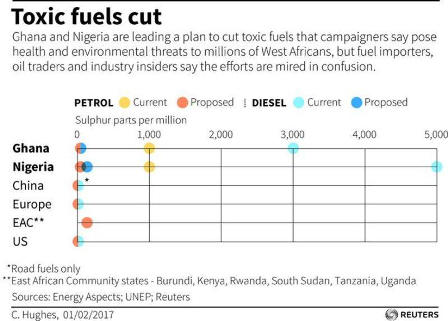FEMI OWOEYE
Year 2017 saw a policy u-turn as regards what could have become reduction of sulfur in fuel used for running vehicles in Nigeria.
 Early in the year, the former Director General of national Automotive Design and Development Council, Engineer Aminu Jalal, on behalf of the Federal government, that the nation would commence reduction of maximum level of sulfur allowed in petroleum fuels sold in the country, effective from 1st July 2017.
Early in the year, the former Director General of national Automotive Design and Development Council, Engineer Aminu Jalal, on behalf of the Federal government, that the nation would commence reduction of maximum level of sulfur allowed in petroleum fuels sold in the country, effective from 1st July 2017.
According to Jalal, the new policy, was necessitated by the need to protect the environment and health of Nigerians against negative impact of vehicle exhaust emissions.
Sulfur in petroleum fuels results in vehicle exhaust emissions that have negative health and environmental impacts. Harmful emission reducing technologies in vehicles also require low Sulfur fuels to be effective.
“The Standards Organisation of Nigeria(SON),” Jalal explained, “after due consultations with relevant stakeholders, have therefore, reduced the maximum allowed levels of Sulfur in Petroleum fuels in Nigeria.”
Affected petroleum products include Diesel fuel (AGO), Petroleum motor spirit (Petrol) and Household Kerosene(HHK).
By implication, from July 2017, Diesel fuel (AGO) should have maximum Sulfur levels of 50 parts per million (ppm)(Reference NIS 948:2017).
Also Petroleum motor spirit (Petrol) were required to have maximum Sulfur levels of 150 ppm (Reference NIS 116:2017) and Household Kerosene(HHK) maximum Sulfur levels of 150 ppm.
Had the policy been followed through, standard of automobile fuels imported or refined in Nigeria would have been moved upward from Euro 3 to Euro 4, a development, which, environmental analysts believed, was overdue t, as Nigeria journeys through the path of full automobile manufacturing.
Also, importers and local manufacturers/assemblers of vehicles powered by Euro 3 engine would have needed to upgrade to modified engines, so as not to fall foul of the new rules.
But, before the year ended, Motoring World gathered that the Nigerian government dropped the idea after weighing its economic pros and cons. Head of a major Nigerian downstream company, Gabriel Ogbechie confirmed to the Platts refining conference in Brussels that Nigeria was not yet ready for the policy.
“I don’t see that happening,” Ogbechie said.
The current maximum sulphur level is 1,000 ppm for gasoline and 3,000 ppm for diesel.
Rainoil, an integrated downstream oil and gas company, holds a contract for crude-for-fuels swaps, which have been the main source for the country’s gasoline imports in the past two years.
Prices for lower sulphur fuels were included in those contracts, but Ogbechie said that as long as the government caps gasoline prices, it will not opt for higher quality fuel that would cost $10-$20 more per tonne.
“That’s an extra $300,000-$600,000 per cargo”, he pointed out, adding,”Is the government ready to absorb that cost? The answer today is no.”
Ogbechie, therefore, recommended that the government should deregulate fuel prices, which, in his view, would enable it to increase quality without shouldering the cost.
“And with elections coming in early 2019,” he warned, “any such move was also unlikely. The price of petroleum products is a highly emotive issue, and the election cycle has already started.”
©Copyright MOTORING WORLD INTERNATIONAL.
All rights reserved. Materials, photographs, illustrations and other digital content on this website, may not be reproduced, published, broadcast, rewritten or redistributed in whole or in part without prior written permission from Motoring World International
Contact: editor.motoringworldng@gmail.com




